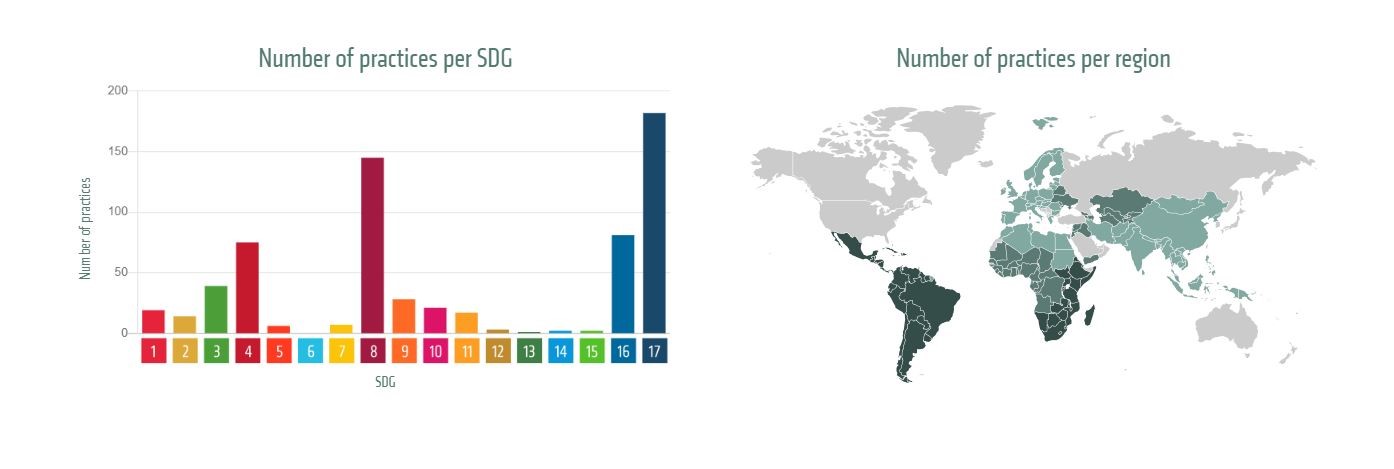
The EUDiF global mapping of diaspora engagement includes spotlight practices from around the world. We have put these together into a searchable database allowing you to find diaspora engagement practices by sector of intervention, SDG, region or country.
Diaspora engagement for development has been going on for decades, if not centuries, in one form or another. One of the driving forces behind our project was to consolidate knowledge on this far-ranging and evolving sector in order to build the project based on evidence. In the global mapping of diaspora engagement, as well as identifying key government actors and diaspora organisations in Europe, we focused on the three Ps: policies, priorities and practices.
Practices hold great value for policymakers and development practitioners alike, serving as inspiration and providing lessons learned. By looking at practices we can identify trends, compare methodologies and explore impact to help design or update policies and projects to be more effective, building on good practice and learning from mistakes. EUDiF has used practices across its research, dialogue and capacity development activities – and now this database is live and searchable for any one interested in diaspora engagement!
What’s in the database?
There are over 350 practices currently in the database, and more to be added in the coming months. You can see at a glance the regional distribution of practices and to which Sustainable Development Goals they contribute (a huge 182 for SDG17 – Partnerships for the goals, because diaspora engagement is almost always about partnership!). The database is searchable by sector (based on a granular list of sectors of intervention identified when building our typology of institutions), SDG, region and/or country. You might even spot highlighted practices, according to EUDiF activities and developments in the sector.
The practice database is designed as an overview of entry points and does not analyse in depth; light information is provided on each practice, along with useful links to continue your research. For in-depth analysis by region and theme, we invite you to explore the resources in Our knowledge for case studies and the “Learning by doing” publications in which we analyse EUDiF-managed projects on topics ranging from skills transfer to heritage tourism to climate action and more.
Using practices in EUDiF
EUDiF uses practices across its activities, from research, to dialogue, to capacity development. What does this mean?
“Our original research aims to bridge theory and practice, using proven examples to build that bridge. Through collecting and analysing practices I can make sense of data and tell a story.” Fanny Tittel-Mosser, Knowledge management & research officer
“Governments, diaspora organisations and non-governmental partners all want to learn from concrete practices – what made something work, what needed to be changed, what might have been done differently with hindsight… When we design dialogues and peer exchanges, practices are essential to give these discussions meaning.” Charlotte Griffiths, Communications officer
“In capacity development, we often plug into an existing practice, or replicate one from another setting and adapt it to the context. Innovation comes as much in the adaptation or upgrade process as it does in designing an initiative from scratch – and all generate new practices so the cycle continues!” Diana Hincu, Capacity Development Specialist
Get involved
The majority of the dataset comes from the global mapping which is updated annually and identifies practices of note in the spotlight sections on each country. If you would like to submit a practice of merit to be included in the database (and potentially the next mapping update), please complete this form.
As EUDiF reaches the end of its first phase, we are looking back at what we have learned in the first five years of implementation and reflecting on how to share this knowledge widely. Let us know how we are doing – are there particular topics you are interested in, more details you want, or different formats? Let us know via eu-diaspora@icmpd.org